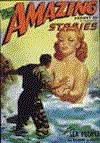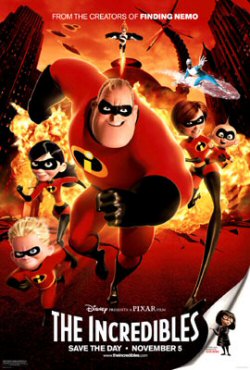|
|
|
'The Incredibles' entertains while it subverts liberal values November 18, 2004 By Franklin Harris Without really trying to be, "The Incredibles" is one of the most subversive films to come out of Hollywood in years. Not that it is subversive in the traditional Hollywood sense. There is no liberal message here. Instead, the movie subverts several decades of liberalism gone awry. Bob and Helen Parr (the voices of Craig T. Nelson and Holly Hunter, respectively) used to be the superheroes known as Mr. Incredible and Elastigirl. One day, they were busy saving the world, and the next they were out of a job, having been driven into hiding by ravenous trial lawyers, suing on behalf of everyone who ever got hurt in the crossfire of superheroes and supervillains.
On the way home from school, Helen lectures Dash about the dangers of using his powers, and Dash complains that there is no point to being special if you can't show others that you are special. "Everyone's special, Dash," Helen says. "Which is another way of saying that nobody is," Dash responds. Bob works as a claims adjuster for an insurance agency, struggling each day with the tedium of his job and the smallness of his cubicle. To relieve his boredom, he slips out once a week with his friend Lucius (Samuel L. Jackson), formerly known as the superhero Frozone. Helen thinks Bob and Lucius are out bowling, but they're really listening to a police scanner and looking for wrongs to right and people to rescue. We sympathize with Dash and Bob, who argues that the whole world has begun to celebrate mediocrity. America was founded on the notion that all people are "created equal." But that means people are equal in the eyes of the law. It doesn't mean everyone is equally talented, no matter what they're teaching in the public schools these days. Bob's clandestine heroics attract the attention of a mysterious woman named Mirage (Elizabeth Pena), who offers Bob a proposition he can't refuse — a chance to be a superhero again for real. Of course, as her name suggests, Mirage isn't really who she appears to be, and Mr. Incredible soon finds himself facing his greatest enemy, Syndrome (Jason Lee), a would-be sidekick determined to take revenge on the heroes who rejected him while claiming the public's adoration for his own. Helen, meanwhile, knows her husband is up to something and follows a trail that leads to Edna Mode (Brad Bird), fashion designer to the world's greatest (and not-so-great) superheroes, and eventually to Syndrome's island base. With Dash and Violet stowing away with Mom, it isn't long before the entire Parr family faces off with the bad guys. In addition to providing Edna's voice, Bird is the movie's writer and director. His earlier film, "The Iron Giant," uses comic-book heroes as a metaphor, but "The Incredibles" embraces the genre with humor and admiration. The Parr family is a thinly disguised Fantastic Four, with Dash's super speed standing in for the Human Torch's flame powers. Youngsters will love the heroics, but "The Incredibles" is really for adults. The action stands on its own, while the humor is more wit than slapstick. An early scene, in which Mr. Incredible and Elastigirl bicker flirtatiously over which of them deserves credit for capturing a burglar, sounds a pleasant note that never fades. Visually, the film comes to life with some of the most impressive computer animation yet produced. Pixar's wizards have created characters who are cartoony yet almost tangible, like the puppets in "Rudolph the Red-Nosed Reindeer," only with greater expression and mobility. Forget "Shrek 2." This is the movie to beat for the Academy Award for best animated film. |

RECENT COLUMNS
Order a helping of Cartoon Network's 'Robot Chicken'
03/31/05
Campaign against video games is political grandstanding
03/24/05
Prize-winning author is 'Wrong About Japan'
03/17/05
Censored book not a good start
03/10/05
Some superhero comics are for 'fanboys' only
03/03/05
'Constantine' does well with its out-of-place hero
02/24/05
'80s publisher First Comics' legacy still felt
02/17/05
Director's cut gives new 'Daredevil' DVD an edge
02/10/05
Put the fun back into 'funnybooks'
02/04/05
Is 'Elektra' the end of the road for Marvel movies?
01/27/05
'House of Flying Daggers' combines martial arts and heart
01/20/05
Anniversary edition of 'Flying Guillotine' has the chops
01/13/05
Movie books still have role in the Internet era
01/06/05
Looking ahead to the good and the bad for 2005
12/30/04
The best and worst of 2004
12/23/04
'Has-been' Shatner is a 'transformed man'
12/16/04
© Copyright 2005 PULP CULTURE PRODUCTIONS
Web site designed by Franklin Harris.
Send feedback to franklin@pulpculture.net.
